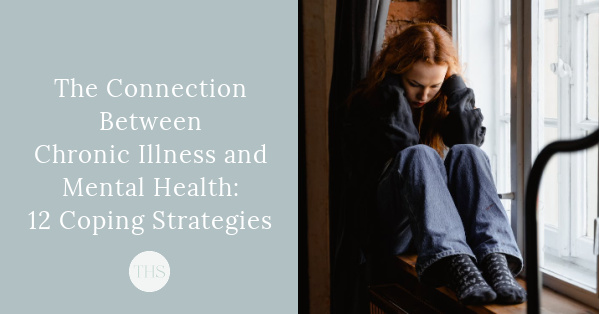Expert Advice: 11 Tips for Boosting Your Daily Happiness

After you receive a diagnosis of a certain chronic illness, it is normal to experience a range of emotions and uncertainties. The daily management of a long-term health condition can take a toll on your mental well-being, often leading to increased stress, anxiety, and depression. Typically, you will be advised to consult different specialists regularly such as endocrinologist and cardiologist. Referrals to mental health specialists are not often included in the standard treatment plan, despite the emotional toll that chronic illnesses can take on patients.
By gaining a deeper understanding of the connection between chronic illness and mental health, you can foster empathy, offer support, and find practical guidance for yourself or your loved one facing these challenges. Whether you are personally living with a chronic illness or a caregiver seeking ways to support someone, this post aims to equip you with the necessary information to cope with the emotional and mental toll of chronic illness.
The connection between chronic illness and mental health is significant and complex, as living with a chronic condition can have a profound impact on your emotional well-being. Chronic illnesses often require long-term management and can lead to feelings of isolation, stress, and anxiety.
The physical limitations and pain associated with chronic illnesses has an effect on your mental health. Reduced mobility may limit your ability to engage in activities you once enjoyed, leading to a sense of loss and frustration. Chronic pain, often experienced in various chronic conditions, can be physically and emotionally exhausting, disrupting sleep, affecting mood, and impeding daily activities.
The MOBILETWIN study conducted by University of Jyväskylä involved 779 twins aged between 71 and 75 years, all of whom were living at home. The study found that chronic diseases significantly reduced the participants’ mobility without them realizing it. Common diseases that impacted the mobility of older adults included coronary heart disease, heart failure, diabetes, rheumatoid arthritis, and osteoarthritis.
Coping with a chronic illness can be challenging, as it often involves managing not only the physical symptoms but also the emotional and psychological stress that accompanies such conditions. A 2017 study published in the American Journal of Epidemiology suggests that for individuals with chronic conditions like asthma, arthritis, or diabetes, stress can exacerbate the impact of the illness. This occurs by amplifying pain, functional limitations, and disability, as well as reducing adherence to medical treatment protocols. Collectively, these factors may contribute to increased psychological distress.
When you recently get diagnosed with a chronic illness, often you isolate yourself from others. You stop reaching them out because of fear, uncertainty, and the physical or emotional challenges associated with your diagnosis. The 2023 National Library of Medicine states that the widespread occurrence of chronic illnesses has led to an increased risk of social isolation. Middle-aged and older individuals, who are more likely to experience chronic conditions, are particularly susceptible to social isolation during their illness journey. Addressing and alleviating these social challenges in the context of chronic disease management is crucial, given the significant impact of isolation on overall well-being.

Depression is a common occurrence when you are living with chronic illnesses due to various interconnected factors. The constant burden of managing the condition, such as frequent medical appointments, medications, and lifestyle adjustments, can contribute to chronic stress and emotional strain, increasing the risk of depression. Based on a study published by WebMD in 2022, the risk of depression is around 10-25% for women and 5-12% for men. However, people with a chronic illness face a significantly higher risk, ranging from 25-33%.
It’s important to note that each person’s experience with chronic illness and depression is unique. While you may experience depression directly related to your illness, others may have pre-existing vulnerabilities or a history of depression that is exacerbated by the challenges of managing a chronic condition.
According to a study published in BMC Public Health in 2019, the prevalence of anxiety among individuals with chronic diseases was found to be 33.9%. Living with a chronic illness can sometimes bring about feelings of anxiety due to various factors. The uncertainty and unpredictability of the condition can make you worry about what the future holds. Dealing with physical symptoms and limitations can leave you feeling helpless and frustrated.
It’s not easy when your illness disrupts your daily life, affecting work, relationships, and social activities, which can lead to a sense of isolation and a loss of who we are. Furthermore, the challenges and stressors that come with managing a chronic condition, such as medication side effects, can also contribute to feelings of anxiety.
Trauma can manifest in various ways, and the factors that contribute to lasting symptoms of post-traumatic stress disorder (PTSD) can differ for each individual. It’s important to recognize that your experience and the PTSD resulting from living with a chronic illness are real and valid, even if they may differ from others.
Research by Edmondson in 2014 suggests that approximately 12% to 25% of individuals who undergo life-threatening illnesses develop medically-induced post-traumatic stress disorder (PTSD). This highlights the significant impact that severe illnesses can have on a person’s psychological well-being, underscoring the need for support and appropriate interventions to address the potential development of PTSD in this population.
Adjustment disorders are psychological conditions that can occur in response to a significant life stressor, such as the diagnosis of a chronic illness. When you are faced with the challenges, changes, and uncertainties that come with living with a chronic condition, you may experience difficulties in coping and adjusting to your new circumstances.
Based on Mayo Clinic, adjustment disorders typically arise within three months of a stressful event and typically last no more than six months after the event concludes. However, chronic adjustment disorders may extend beyond the six-month timeframe, with symptoms persisting over a more prolonged period.

Living with a chronic illness poses unique challenges and can be particularly difficult to manage. The management of both the physical symptoms and the associated mental health challenges is essential for maintaining a balanced and fulfilling life. The strategies below highlight key approaches to address the challenges of chronic illness and promote better mental health.
Self-care is an important aspect of maintaining physical, mental, and emotional well-being, especially when you are struggling with accepting your chronic illnesses. It involves consciously and actively taking care of oneself to promote health, reduce stress, and enhance quality of life.
Indeed, self-care is a highly individualized practice, and it is vital to discover and implement strategies that align with your unique needs and circumstances. What works for one person may not necessarily work for another. Take the time to explore different self-care practices and assess how they impact your physical, mental, and emotional well-being. Pay attention to what brings you comfort, relaxation, and a sense of rejuvenation.

Both over-the-counter (OTC) drugs and prescription medications are essential for managing chronic illnesses as they target specific symptoms, offer relief, and support ongoing treatment. However, it’s important to be aware that some medications may have the potential to cause anxiety as a side effect.
Always remember that experiencing anxiety does not diminish your worth or strength in any way. It’s a valid response from the medications that can be effectively addressed and managed with the help of healthcare professionals.
Disclaimer: The following information is for educational purposes only. Always talk to your doctor and/or pharmacist before making any changes to your medication intake.
Psychotherapy is essential for managing chronic illness and promoting mental health. Also known as talk therapy, it encompasses various treatments that assist you in identifying and modifying challenging emotions, thoughts, and behaviors. Typically facilitated by a licensed mental health professional, psychotherapy occurs in one-on-one or group settings to provide support and guidance.
Support groups offer a safe space to discuss challenges, share strategies for coping, and provide emotional support. This can be in-person or online and may focus on specific chronic illnesses or broader topics related to living with chronic conditions. Being part of a support group can help you feel less isolated, gain insights from others, and develop a sense of belonging.
The integrative care model combines conventional medical treatments with complementary and alternative therapies to address the physical, emotional, mental, and spiritual aspects of a person’s well-being. It takes a holistic approach to healthcare, recognizing the importance of treating the whole person. By integrating different approaches, such as medication, surgery, acupuncture, massage, and psychological support, the goal is to optimize health and well-being.

Developing a strong support network helps you feel supported, understood, and less alone in your journey with chronic illness. It involves identifying supportive individuals, communicating your needs, seeking professional support, joining support groups, cultivating positive relationships, exploring community resources, practicing reciprocity, and utilizing online platforms. A strong support network provides emotional, practical, and informational support, which can significantly improve coping and overall well-being.

It is crucial to recognize the unique challenges you faced with chronic illness and mental health issues. By acknowledging your struggles and offering empathy and reassurance, we can create a supportive environment that promotes understanding and acceptance. It is also important to raise awareness about the connection between chronic illness and mental health, as this knowledge empowers you to seek appropriate support and treatment.
Let us all strive to become advocates for ourselves and others in similar situations, promoting compassion, empathy, and resilience in the face of these challenges. Together, we can foster a society that prioritizes your holistic well-being as well as address chronic illness and mental health concerns.
Author bio: Shauna Larson, a passionate mental wellness advocate. For the last five years, she employs her personal experience and deep understanding of mental health to illuminate the complexities and challenges that many face every day. Her thoughtful insights and relatable narratives have been featured in a variety of publications, cultivating a loyal readership that values her authentic voice and practical advice.